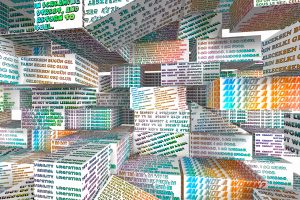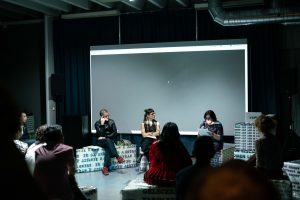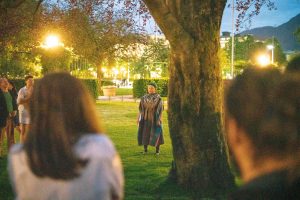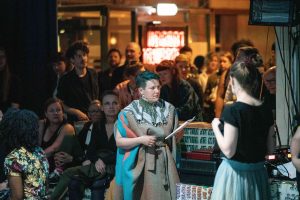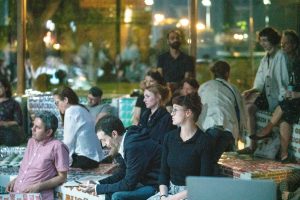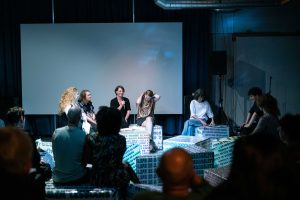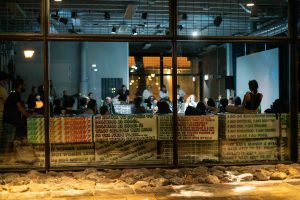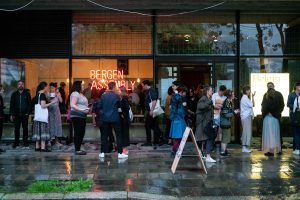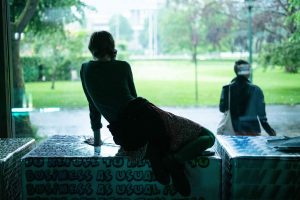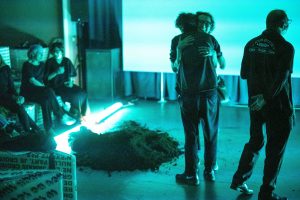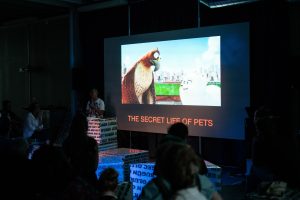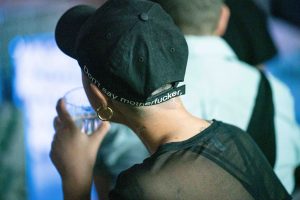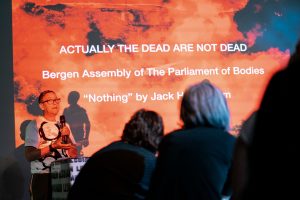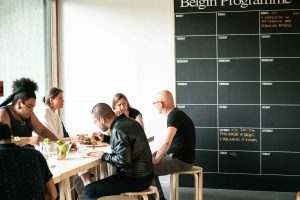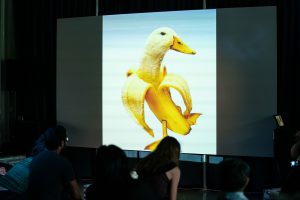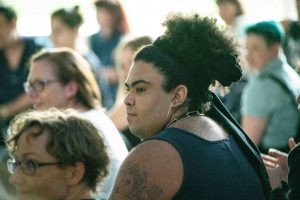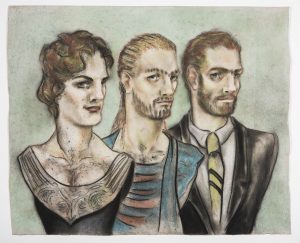The Parliament of Bodies
Conceived by Paul B. Preciado and Viktor Neumann
With contributions by Aérea Negrot, Andreas Angelidakis, Betty Apple, Synnøve Bendixsen, Anine Bråten, Banu Cennetoğlu, Nikita Dhawan, Sarah Diehl, Chto Delat, María Galindo, Jack Halberstam, Ama Hanssen, Caspar Heinemann, Max Jorge Hinderer Cruz, Nelli Kambouri, Theodore (ted) Kerr, Ewa Majewska, Daniel Mariblanca, Jota Mombaça, Mari Norbakk, Narcissister, Elin Már Øyen Vister, Margarita Tsomou, Sunniva Vik, and others.
On the occasion of Bergen Assembly 2019, the Parliament of Bodies (PoB) calls for an anti-fascist, transfeminist, and anti-racist coalition and the celebration of many voices fighting against the techno-patriarchal and colonial regime worldwide. Its first gathering in the city of Bergen on 15 June 2019 is the start of many activities of the PoB in Bergen, aligning itself to the conceptual framework of Actually, the Dead Are Not Dead.
The PoB calls disenfranchised bodies and subaltern organs to gather in joyful assemblies commending somatic dissidence, transfeminist critique, the celebration of the vulnerable body, and affective belongings beyond identity politics.
FROM ATHENS TO BERGEN
PoB was originally conceived as the Public Programs of documenta 14. Acknowledging the paradoxical nature of effectively transforming institutional structures and economies from within, the PoB has since mutated into an apatride institution-in-becoming without constitution, seeking bonds with other institutions to provoke politicisation and critical metamorphosis.
Born in 2016 during the Athenian experience of the failure of representative democracy, the PoB took its name and vocation after witnessing the Greek government refusing to accept the ‘OXI’ vote of its citizens, from seeing the bodies and voices of thousands of Greek people demonstrating on Syntagma Square, mixing with the countless migrants and refugees arriving every day to the Port of Piraeus during the long summer of migration. The PoB developed from the need for a counter-parliament of living bodies, beyond markets and nations, beyond national belonging and identity politics.
This later became obvious in the city of Kassel with its entanglements with the military industry, its exportation of weaponry, and the controversies around its cultural industry’s main attraction, documenta. Already an institution-in-becoming, it became again urgent in Warsaw when PoB dared to gather during the centenary of Poland’s National Independence Day in November 2018, a date known for the hyperbolic celebration of nationalism, white Catholic supremacy, and heteronormativity.
Once again, it becomes urgent in Bergen, a city within one of the allegedly most progressive democracies for those with citizenship but certainly not for those without, and within a nation entangled in ecological exploitation, where ‘even the revolution would be state-funded’, as stated by one of the many voices that the PoB encountered during research in Bergen.
The PoB acts as a counter-mirror, denouncing the pitfalls of representative European democracies, and understanding politics not as ideology but as poetic action, learning from and leaning towards the methodologies of art, critical theory, and activism. The PoB understands itself as a site for cultural activism, a critical device to collectively imagine and construct other ways of producing, reproducing and governing knowledge and life, visibility and affect, implicating bodies (human and non-human, objects, dispositifs, ensembles, etc.), subjugated knowledges and artistic practices. The PoB is made of those who lack full political recognition within the framework of the nation-state.
The PoB neither provides a single discourse on identity, nor a homogeneous space of race, gender, or sexual representation. On the contrary, it aims to create a new forum for artist and activist, an open arena of experimentation, performativity, counter-media production, and debate essential for a new planetary somatic democracy to awaken. Inspired by subaltern traditions of resistance, the PoB calls for a planetary revolution where the subject is no longer the ‘proletarian’, ‘women’, or ‘the colonised’, but rather the vulnerable living body confronted by all forms of necropolitical, neocolonial, and technopatriarchal techniques.
THE OPEN FORM SOCIETIES
The PoB will introduce already established and newly created Open Form Societies in Bergen. Inspired by the ‘open form’ methodology of architect Oskar Hansen and modelled on the endeavours of the countercultural antislavery bonds of the late 18th century, the Open Form Societies aim to function as self-learning, self-organised counter-publics that generate their own activities and set their own critical agenda.
The Apatride Society of the Political Others, established in Athens in September 2016, will further challenge the tropes of the nation-state through exploring anti-colonial discourses and practices. The Society of Friends of Lorenza Böttner, established in Kassel and inspired by the eponymous mouth and foot painter and her practice of somatic and gender dissidence, will begin its activities which will lead to the Impossible Parliaments during the Opening Days of Bergen Assembly in September 2019. The Society of Black Milk, established in Warsaw in order to face the Polish parliament’s violent attempts to outlaw abortion, will further explore the biopolitics and necropolitics of the nation-state and reproduction, and its relation to the development of patriarchal power technologies.
FIRST PUBLIC APPEARANCE OF THE SOCIETY OF FRIENDS OF BERGEN AND THE SOCIETY IN TRANSLATION
The newly created Society of Friends of Bergen will be publicly acting for the first time at Bergen Assembly 2019’s public space Belgin. The names of both the society and the venue are reminiscent of the Turkish singer Bergen (1958 – 1989), otherwise known as Belgin Sarılmışer. The singer’s life story influenced her music and manifested her status as an icon of feminist resistance against patriarchal power and domestic and sexual violence. When a rising star, her husband threw nitric acid in her face during a concert leading to the blinding of one of her eyes. Though she continued to be involved with her predator, she refused his violent attempts to silence, victimise, objectify, and domesticise her. Rather, she established herself as the Woman of Agony in the limelight of an ever-growing following and became renowned as the ‘Queen of Arabesque’. Fatally shot by her husband in 1989, she has remained a complex symbol of sorrow and emancipation in Turkey to this day.
The Society of Friends of Bergen will host the first gathering of the PoB in Bergen at Belgin, calling everyone who refuses to be abused anymore, everyone who detests the sexual regime used by necropolitical and patriarchal techniques of subjugation, in the domestic sphere, in many world conflicts, or led by mere economic interest, and that allows bodies to be raped and murdered, wounded and diseased, traumatised and distressed, criminalised and marginalised, stigmatised and deprived of agency. The Society of Friends of Bergen becomes an unapologetic and raging apparatus that joyfully celebrates its anger towards patriarchy while aiming to draw the contours of a new utopia for planetary transformation. The PoB calls for all bitches and witches to come together and to engage collectively, freely, and joyfully on a radical enlargement of the public sphere and the proliferation of new forms of critical subjectivity.
The newly formed Society in Translation will be also publicly acting for the first time during the night of June 15, dedicating its activities to the investigation of the politics of naming, wording and translating. The Societyhas been initiated through the collective process of updating and translating The List into Norwegian: Compiled and updated each year by UNITED for Intercultural Action, an anti-discrimination network, The List traces information relating to the deaths of 36,570 people who have lost their lives within or on the borders of Europe since 1993 due to state policies (documented as of 1 April 2019). From this gathering on, the Society in Translation will be devoting its activities to examine the legal and ethical navigation of politicized language and to highlight the transformative potentials of re-framing as strategy of caretaking.
THE PARLIAMENT OF BODIES IN JUNE: A PARLIAMENT OF BITCHES
The word feminist was invented by the French physician Faneau de la Cour in 1871 to refer to men who suffered from tuberculosis and whose bodies, according to medical discourse, were ‘feminised’ by sickness. Only a few years later, the son of Alexander Dumas used the notion of ‘feminist’ to insult men who supported women fighting for their rights to vote and access technologies of government. Thus, sick, fragile and non-reproductive men, but also anti-patriarchal men, were said to be the first ‘feminists’ of history.
It was some time until suffragist women appropriated the insult ‘feminist’, transforming it into the site of their political action. Some years before, in 1851, the black abolitionist Sojourner Truth asked an assembly of white women, ‘Am I not a woman?’, opening a debate about the relationships between race and sex struggles that is still ongoing. In 1980, writer and theorist Monique Wittig affirmed ‘lesbians are not women’, in front of a self-defined heterosexual assembly.
Rather than a natural, stable site of action, feminism is a contested terrain open to endless struggles and transformations. In the early 1990s, Annie Sprinkle and the collective PONY (Prostitutes of New York) extended feminism to whores, bitches, and sex workers. If Juan Esteban Muñoz said that ‘we have never been queer’, making queerness into a utopia, we could say today that we have never been feminist. Rather than being immediately identified with women as a given historical subject, feminism thus becomes a poietic tradition for revolutionary transitions.
Who is the subject of feminism today? Can cis-men dis-identify themselves from dominant patriarchal masculinity? What does it mean today to be transfeminist? Can we speak about feminism beyond the framework of identity politics of Western social democracy? What would be a feminism without men and women? What does it mean to speak of queer politics beyond the opposition of heterosexuality and homosexuality? What is the relationship of feminist politics and practices with anti-colonial, crip, and animalist struggles?
For the first gathering in Bergen artists, musicians, philosophers, performers, activists, writers and scholars will constitute a Parliament of Bitches while approaching summer solstice. The Parliament of Bitches gathers, on a night of brightness on 15 June 2019, to celebrate and extend the underground traditions of feminist resistance, heretical assemblies of witches and somatopolitical dissidents, of female, trans-female and non-female, anti-colonial and anti-patriarchal sexual warriors and healers.
The name Parliament of Bitches is inspired by Miguel de Cervantes’ novel The Dialogue of the Dogs (1613) in which two dogs, amazed by their unexpected ability to talk, discuss and debate the fate of the world and of their living conditions. For its first Bergen meeting, the Parliament of Bodies curates a collection of voices of ‘bitches’, not-yet-fully-human voices, fighting to redefine citizenship and belonging.
NEW SOFT ARCHITECTURE BY ANDREAS ANGELIDAKIS
In Bergen, the PoB collaborates again with the architect and artist Andreas Angelidakis to create a new iteration of his soft architecture that can be assembled and reassembled in countless ways to reorganise the inner structure of the space and to create different platforms for enunciation, speech, display, or action. Angelidakis’ latest iteration called LOGOS (2019) brings together quotations by some of the artists and thinkers who have inspired the programme of the PoB for Bergen Assembly, including among others, Joanna Hevda, María Galindo, Virginie Despentes, Pedro Lemebel, Jack Halberstam, Audre Lorde, and Bergen.
From 15 June 2019 onwards, The Parliament of Bodies and its Societies will spread their activities in and beyond Bergen to create synthetic alliances between different struggles for minor and dissident forms of sovereignty, recognition, and survival.
Paul B. Preciado
Viktor Neumann
ACTIVITIES

